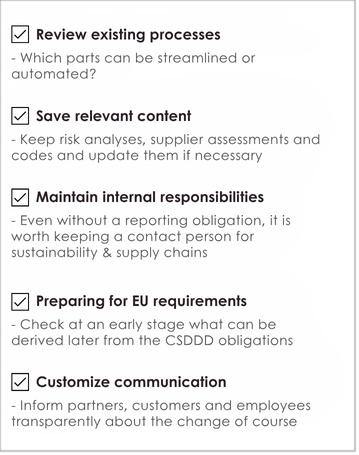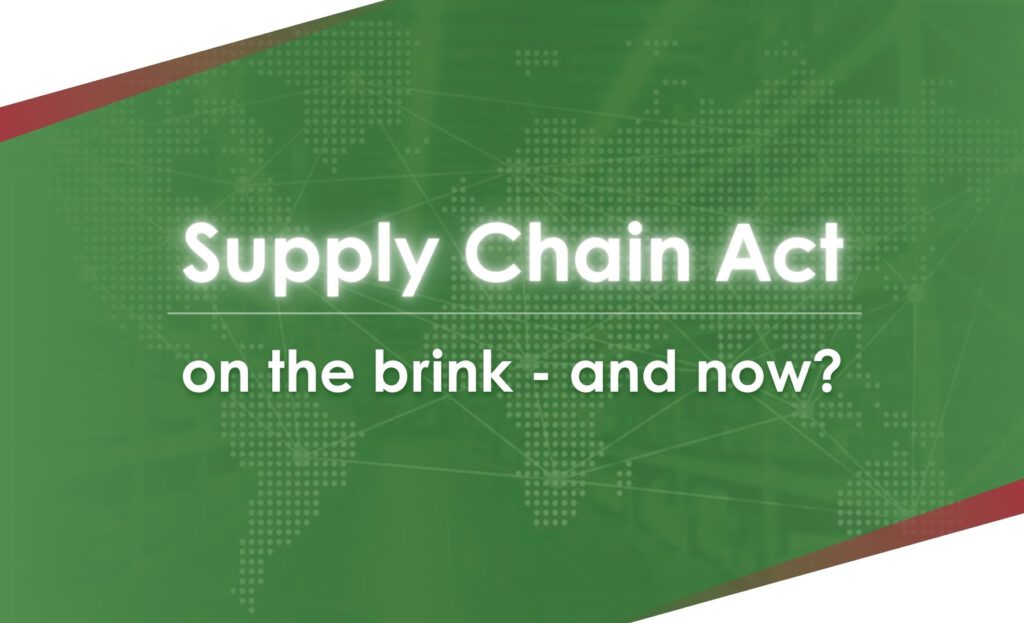It sounded good – but it was difficult to implement: the German Supply Chain Due Diligence Act (SCDDA) was intended to strengthen human rights and environmental standards along global supply chains. For many SMEs, however, it was one thing above all: a bureaucratic monster with unclear requirements, high costs and little practical benefit.
Since the beginning of 2024, it has applied to companies with 1,000 employees or more – but it is already clear that the law will be abolished.
“We are also abolishing the national Supply Chain Due Diligence Act (SCDDA). It will be replaced by a law on international corporate responsibility that implements the European Supply Chain Directive (CSDDD) in a low-bureaucracy and enforcement-friendly manner. The reporting obligation under the SCDDA will be abolished immediately and completely eliminated.”
(Coalition agreement 2025)
This is good news for many companies. Even if the basic idea of the law is correct, the practical implementation was simply not feasible for many companies.
What exactly will change under the SCDDA – and for whom?
The most important message: the reporting obligation under the SCDDA no longer applies with immediate effect.
For companies above the 1,000-employee threshold, this clearly means less legal pressure to implement processes and documentation in accordance with SCDDA requirements.
The SCDDA itself is being replaced by a new law that is intended to implement the upcoming EU Supply Chain Directive (CSDDD) – as simply and practically as possible and without duplicating bureaucracy.
For whom this pays off in particular
The abolition of the SCDDA is a noticeable relief, especially for small and medium-sized companies. Even if they were not formally subject to the law, they were still heavily affected indirectly:
Large companies often simply passed on their own obligations – and demanded detailed information, risk analyses or evidence from their suppliers.
The result: a lot of bureaucracy, a lot of effort – but little tangible added value.
Many smaller SMEs rightly asked themselves:
- What exactly do we have to deliver?
- How deeply do we need to check our suppliers?
- And is it even worth it for us?
With the announced abolition of the SCDDA, this burden is off the table, at least for the time being. The new political course brings planning security – and the opportunity to decide with a sense of proportion what is really sensible and necessary, also with regard to the upcoming EU directive.

And what’s next? The EU CSDDD directive – a reform with question marks
With the German Supply Chain Act in retreat, the focus is now turning to Brussels. In July 2024, the EU adopted the Corporate Sustainability Due Diligence Directive (CSDDD) – a uniform legal framework that is intended to introduce binding due diligence obligations for companies across Europe.
The promises: less bureaucracy, clearer rules, more efficiency.
The reality is that much remains to be seen – and past experience leaves room for doubt.
The planned implementation (as of April 2025):
In February 2025, the so-called Omnibus Initiative adopted a series of changes that are intended to lead to a postponement and in some cases simplified requirements:
- Deadline for transposition into national law until July 2027
- Staggered application:
- from July 2028: Companies with >5,000 employees & >€1.5 billion turnover
- from July 2029: >3,000 employees & >€ 900 million turnover
- from July 2030: >1,000 employees & >€ 450 million turnover
- Obligations should be limited to direct business partners
- Inspection interval: every 5 years instead of annually
- Civil liability remains in play – but weaker
For most SMEs, this means that direct obligations will not come until 2030 at the earliest – if at all.
However, those who supply large customers will continue to be indirectly affected, e.g. through requirements in supplier questionnaires or purchasing conditions.
What does this mean in practice?
Many SMEs are rightly cautious after their experiences with the SCDDA. The CSDDD is also announced as “low-bureaucracy” – but this is exactly what was also promised with the SCDDA. The integration of the supply chain, the documentation requirements and possible liability risks could turn out to be significantly more complex than expected, depending on national implementation.
So the relief is real – let’s see how permanent it is.
The requirements will come – just later and hopefully better coordinated.
Our assessment:
- Those who are not currently affected do not have to take action immediately – but should stay tuned, especially as part of complex supply chains.
- Companies that have already invested in SCDDA structures should not be too hasty in dismantling them.
- Much of this – risk analyses, supplier management, codes of conduct – can be adapted to the upcoming EU regulation with little effort.
- Streamlining processes makes sense – but the foundations are already in place and should be used.
- The current pause for breath is an opportunity:
- Don’t discard everything – simplify, focus and document in a targeted manner.
- SMEs should keep a close eye on developments, but not fall into actionism. Those who consolidate wisely now will save themselves the next feat of strength later.

Stay tuned now – with our SCDDA succession check
You have built up structures around the Supply Chain Act – and are now wondering what remains of it?
👉 With our “SCDDA Succession Check” we check together with you:
- Which processes can be usefully reused for CSDDD
- Where effort can be reduced – without reputational risk
- How to make your sustainability management lean but future-proof







